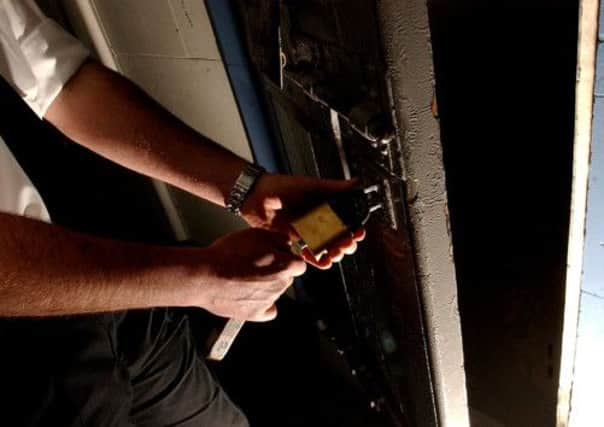Scots murderer takes prison vote bid to top court


George McGeoch, from Glasgow, who is serving a life sentence for the 1998 murder of Eric Innes in Inverness, challenged the ban on prisoner voting at a hearing of the Supreme Court yesterday.
The hearing came just days after MSPs rejected moves to allow some inmates to vote in next year’s independence referendum.
Advertisement
Hide AdAdvertisement
Hide AdSeven Supreme Court justices considered challenges by McGeoch and child murderer Peter Chester at the hearing in London yesterday (Mon).
Chester, who is in his 50s, is serving life for raping and strangling seven-year-old Donna Marie Gillbanks in Blackpool in 1977.
The panel of judges heard opening arguments on behalf of both men during the first day of a two-day hearing and submissions in response to the pair’s appeals.
At the start of yesterday’s proceedings, Aiden O’Neill QC, for McGeoch, said that his arguments before the court were “based solely and squarely” on European Union (EU) law.
He said that although the case was not a “class action”, it “may have implications” for others.
The European Court of Human Rights ruled in 2005 that a blanket ban on serving prisoners going to the polls was incompatible with the European Convention on Human Rights (ECHR), relating to the right to free and fair elections.
Mr O’Neill told the Supreme Court the question was whether a British citizen could “claim EU rights against his own Government, in particular, voting rights”.
He told Lords Hope, Hale, Mance, Kerr, Clarke, Sumption and Hughes: “The Government is bound to respect rights, including EU rights.”
Advertisement
Hide AdAdvertisement
Hide AdMcGeoch, received a minimum term of 13 years, but due to subsequent convictions will not be considered for parole until 2015.
In written argument before the court Hugh Southey QC, representing Chester, said his case “concerns the right of convicted prisoners, and in particular, indeterminate sentence prisoners whose minimum terms (or tariffs) have expired, to vote in parliamentary and European parliamentary elections”.
The UK and Scottish government’s have opposed moves to allow convicted prisoners to vote in elections, with David Cameron telling MPs that the idea of giving prisoners the vote makes him “sick”.”
Convicted prisoners were not included in the Scottish Independence Referendum (Franchise) Bill, which gave 16- and 17-year-olds the right to vote in next year’s ballot on independence.
Labour MSP Graeme Pearson, a former senior police officer, called for an end to the “blanket ban” on convicted prisoners voting during a Holyrood debate on the issue.
However, Pearson yesterday said that convicted murderers such as McGeoch and Chester should not be among those allowed to vote.
He said: “It was never in my thinking that those convicted of murder would be in the class of prisoners who’d get the vote.
“I was thinking in relation to the referendum in particular and 16 and 17 year olds in young offender institutions serving sentences such as six months example.
Advertisement
Hide AdAdvertisement
Hide Ad“There are some prisoners who should not get the vote such as those involved in organised crime groups, drug dealers and those convicted of murder.”
Tory MSP Alex Johnstone claimed the legal challenge to the ban on prisoner voting was a waste of taxpayers’ cash. He said: “It’s entirely inappropriate that prisoners should be given the vote and the fact that we are being forced to go through this process is a waste of public money.
“If the courts find in favour of these men, than public money will have been spent to prevent what the public wants and it would be a mockery of justice.”
“We are on a very difficult path if human rights laws are being used to prevent the public will from prevailing.”
Scotland’s Deputy First Minister Nicola Sturgeon dismissed a move to allow convicted prisoners to vote in the independence referendum last month saying they “break their contract with society”.